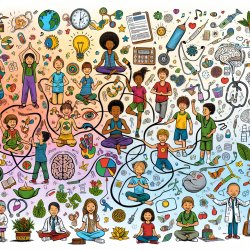Introduction
In the ever-evolving field of pediatric therapy, understanding the intricate relationship between the mind and body is crucial for developing effective strategies to support children facing adversity. A recent study titled The Role of the Mind-Body Connection in Children with Food Reactions and Identified Adversity: Implications for Integrating Stress Management and Resilience Strategies in Clinical Practice sheds light on the importance of integrating stress management and resilience strategies in clinical practice. This blog explores the key findings of the study and offers practical insights for practitioners looking to enhance their skills and improve outcomes for children.
Understanding the Mind-Body Connection
The study highlights the significant impact of stress and adversity on children's health, particularly in relation to gastrointestinal disorders and food reactions. The mind-body connection, often referred to as the gut-brain axis, plays a pivotal role in how stress manifests physically in children. By understanding this connection, practitioners can better address the underlying causes of these conditions and tailor interventions to promote resilience and well-being.
Key Findings and Implications
- Prevalence of Stressors: The study found that a majority of children with non-allergic food reactions experienced significant stressors, with the management of medical conditions being the most common.
- Resilience Strategies: Children who utilized resilience strategies, such as sports, mindfulness activities, and supportive relationships, showed improved coping mechanisms and overall well-being.
- Integrative Modalities: Mind-body practices, including mindfulness, yoga, and cognitive-behavioral therapy, were commonly used by children with stressors, highlighting the potential benefits of these interventions in managing stress and enhancing resilience.
Practical Applications for Practitioners
For practitioners working with children facing adversity, integrating mind-body interventions can be transformative. Here are some actionable steps to consider:
- Screen for Stressors: Implement routine screenings for stressors and adversity in clinical assessments to identify children who may benefit from targeted interventions.
- Promote Resilience: Encourage activities that foster resilience, such as sports, creative pursuits, and mindfulness practices, to help children develop coping skills and emotional regulation.
- Integrate Mind-Body Practices: Incorporate integrative modalities like yoga, meditation, and cognitive-behavioral therapy into treatment plans to address the mind-body connection and improve overall health outcomes.
Encouraging Further Research
While the study provides valuable insights, there is still much to learn about the complex interplay between stress, resilience, and integrative medicine in pediatric populations. Practitioners are encouraged to stay informed about emerging research and consider participating in studies that explore innovative approaches to supporting children with food reactions and adversity.
To read the original research paper, please follow this link: The Role of the Mind-Body Connection in Children with Food Reactions and Identified Adversity: Implications for Integrating Stress Management and Resilience Strategies in Clinical Practice.










